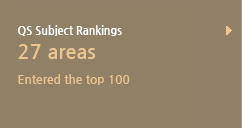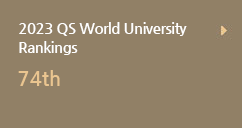“Restoring humankind’s social immunity is the only solution”
World-leading scholars discuss post-coronavirus era
Next Normal Conference 2020 held successfully

Leading scholars gathered in Seoul to predict the next normal in the post-coronavirus era, and to explore directions for the sustainable development of humankind.
On July 23, Korea University Medicine successfully hosted the Next Normal Conference 2020 with Johns Hopkins University, University of Manchester, and Freie Universität Berlin as joint organizers.
The conference, under the theme of “Reimagining The Next Normal,” was held at Yookwangsa Hall in the College of Medicine at Korea University. The list of prominent scholars attending the event included Jim Dator, pioneer futurist and professor emeritus of the University of Hawaii at Manoa; Martin McKee, professor of the London School of Hygiene & Tropical Medicine; Kwon Jun-wook, director of the National Institute of Health; and Kim Woo-joo, professor of the Department of Infectious Diseases at Korea University Guro Hospital.
In his congratulatory telegram, Prime Minister Chung Sye-kyun stated, “The conference will lay the foundation for international solidarity and cooperation. I look forward to discussions on realizing the value of togetherness in various fields.”

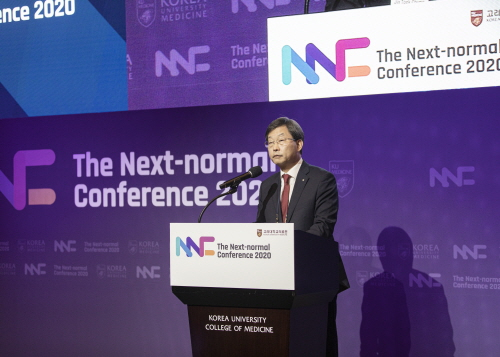
Chung Jin Taek, the president of Korea University, emphasized the significance of the conference in his congratulatory speech, saying: “There’s no doubt that we will overcome this crisis, but we must prepare for what comes next. I believe humanity will be able to advance forward if we work together as a global community in exercising creativity and creating new value for the greater good.”
The event kicked off with a keynote speech from professor Jim Dator titled, “Learning from a Cleft in Time: Four Futures”. Professor Dator proposed four possible futures for humankind, saying, “It’s impossible to predict a single future, but we can design and explore ideas of our preferred future.” In his advice for Korea, he said, “Korea has achieved astonishing economic and cultural growth by following in the steps of successful Western countries. Its exemplary response to COVID-19 has also made it a role model for the world. Now, Korea must set its own creative path instead of trailing behind others. The past 50 years and the next 50 years will be very different for the United States. Accordingly, other countries must step up to play new roles as members of international society. Although attaining hegemony in the near future will be difficult, Korea can fulfill new roles by cooperating with other countries. Try not to rest satisfied with the present, and do take the necessary measures to turn the crisis into an opportunity.”
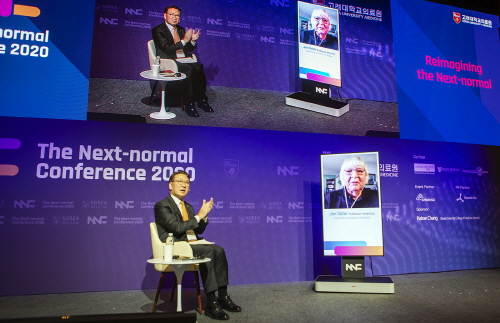
The highlight of this conference was the exchange between Kim Young-hoon, executive vice president for medical affairs at Korea University, and Professor Jim Dator. Kim Young-hoon said, “We must seriously consider how the pandemic has been more damaging for the socially neglected. Viruses affect the most vulnerable. To prepare for new infectious diseases in the days after COVID-19, we should boost our social immunity and raise the Maginot Line of life.” The two experts shared their wisdom on the next normal through an active exchange of opinions on various issues, such as solidarity in response to COVID-19, coexistence of humans and AI, and the ideal role of Korea in international society.
Next on the program was a special lecture by Song Jin-won, a professor in the Microbiology Department of the College of Medicine at Korea University, and Yoon Young-wook, dean of the same college. Under the topic of ‘‘From Hantaan virus to next one: What the world can learn from virus,” Professor Song introduced the history of Korea University Medicine, beginning from the discovery of the Hantaan virus by Professor Lee Ho-wang to recent vaccine developments. He also emphasized the need for effective global monitoring and diagnosis, international cooperation in disease prevention, and the development of a new vaccine platform to combat new viruses.
The integrated session showed the promise of collective intelligence, with scholars from various fields engaging in active discussions. Kwon Jun-wook, director of the National Institute of Health, shared his experiences at the frontline of K-Disease Control in a presentation titled “Korea’s Response to COVID-19 from the Public Health Perspective.”
Martin McKee, professor at the London School of Hygiene & Tropical Medicine, gave a lecture on “COVID and the economy – we need a comprehensive response that includes both.” He said, “The influenza pandemic that struck the United States in the early 20th century taught us a lesson that saving lives should be of the utmost priority regardless of circumstances. The cities that began quarantine the earliest and lifted restrictions the latest were the ones that saved the most lives and saw the most rapid economic recovery.” Countries with high death tolls, namely, the United States, Russia, the United Kingdom, Brazil and India, were under populist governments. The professor warned of the risks involved in one-sided efforts to save the economy, especially those that ignore scientific aspects. He encouraged governments to make bold moves in budget execution, so as to protect the economy, protect laborers by maintaining employment, and to prepare for recurring pandemics.
Courtland Robinson, professor at the Johns Hopkins Bloomberg School of Public Health, spoke on “Human Immobility and Health in a Post-COVID-19 World.” He said, "Overseas travel was a key factor behind the spread of COVID-19 in the first six months, and this applied to immigrants, travelers, businesspersons, and travelers with connecting flights. We must re-discuss strategies for the post-coronavirus age, including the risk of international travel, the impact of forced immobility (capital, labor, goods), and a comprehensive joint response within and outside the country."
Lee Eun-jeung, professor at the Institute of East Asian Studies at Freie Universität Berlin, gave a lecture titled “Racism and Discrimination in COVID-19 Response.” She introduced the history of discrimination against Asians from as early as a few centuries before the pandemic, and revealed how such attitudes have been prevalent in Western Europe during the COVID-19 pandemic. The professor stressed, “Discussions on the next normal after COVID-19 are essential, but deep-rooted racial discrimination and prejudice are interfering with the advancement of humanity.”
Kim Woo-joo, professor of the Department of Infectious Diseases at Korea University Guro Hospital, presented a balanced perspective on COVID-19 and new infectious diseases under the title of “Beyond COVID-19 pandemic: challenges and response strategy for the next normal.” He said, “For humankind to advance forward, we must reflect on our consumption of wild animals, and the environmental destruction caused by indiscriminate development, which have all contributed to the chain of new infectious diseases in the 21st century. We should adopt a One Health approach, seeing the health of humans, animals, and the environment as one.”
Lastly, Yoon Seok-joon, dean of the Graduate School of Public Health at Korea University, chaired a session with a panel comprised of Cha Ji-ho, professor of the Humanitarian and Conflict Response Institute at the University of Manchester, and Park Man-seong, professor of the Microbiology Department of the College of Medicine at Korea University. During this grand finale, the scholars freely discussed topics that were addressed in the integrated session.
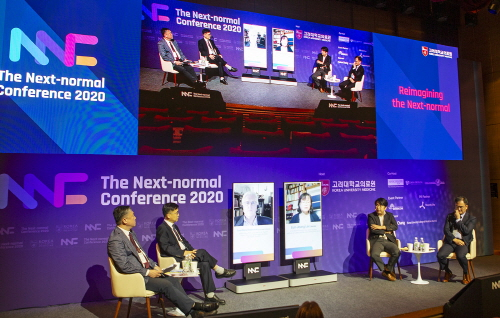
While the conference focused on the topic of the next normal after COVID-19, the event itself was the culmination of future technology. Professor Jim Dator, who participated in the event via a webcam from his home in Hawaii, felt very present and connected as he conversed with Kim Young-hoon, executive vice president for medical affairs at Korea University Medicine. Courtland Robinson and Lee Eun-jeong also attended the integrated session online from Baltimore and Berlin, respectively. The seats were limited to 45 persons due to Korea’s social distancing policy, but the event was streamed live in English and Korean over the official YouTube account of Korea University Medicine. Scholars from around the world were able to watch and participate in the conference in the comfort of their own homes.
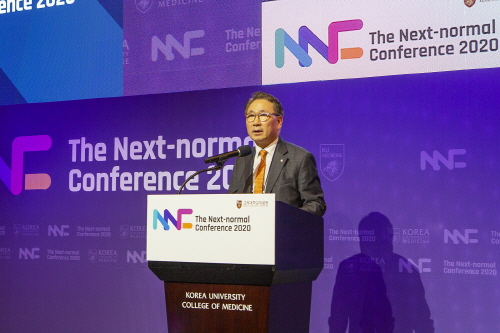
Kim Young-hoon, executive vice president for medical affairs at Korea University, said, “The COVID-19 pandemic has had the most impact on classes that are regionally isolated and neglected by society. Because humans are capable of empathizing and connecting with one another as homo empathicus, we must triumph over COVID-19 and continue forward through co-existence and cooperation. Medicine will be what sets the standard for the next normal. Korea University Medicine will open a K-Bio campus in Jeongneung, and establish world-class facilities for research on new infectious diseases. By launching a platform for exchange in education and research with academies, universities, and research institutes, we will play our part in ushering in the age of Next Medicine, and contribute to the advancement of humanity.”


